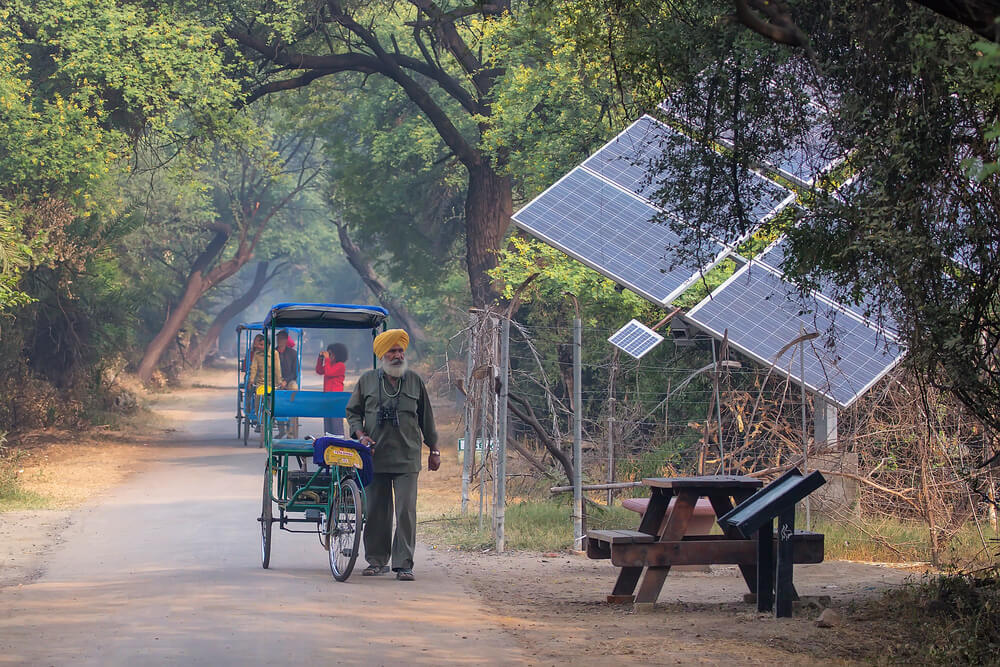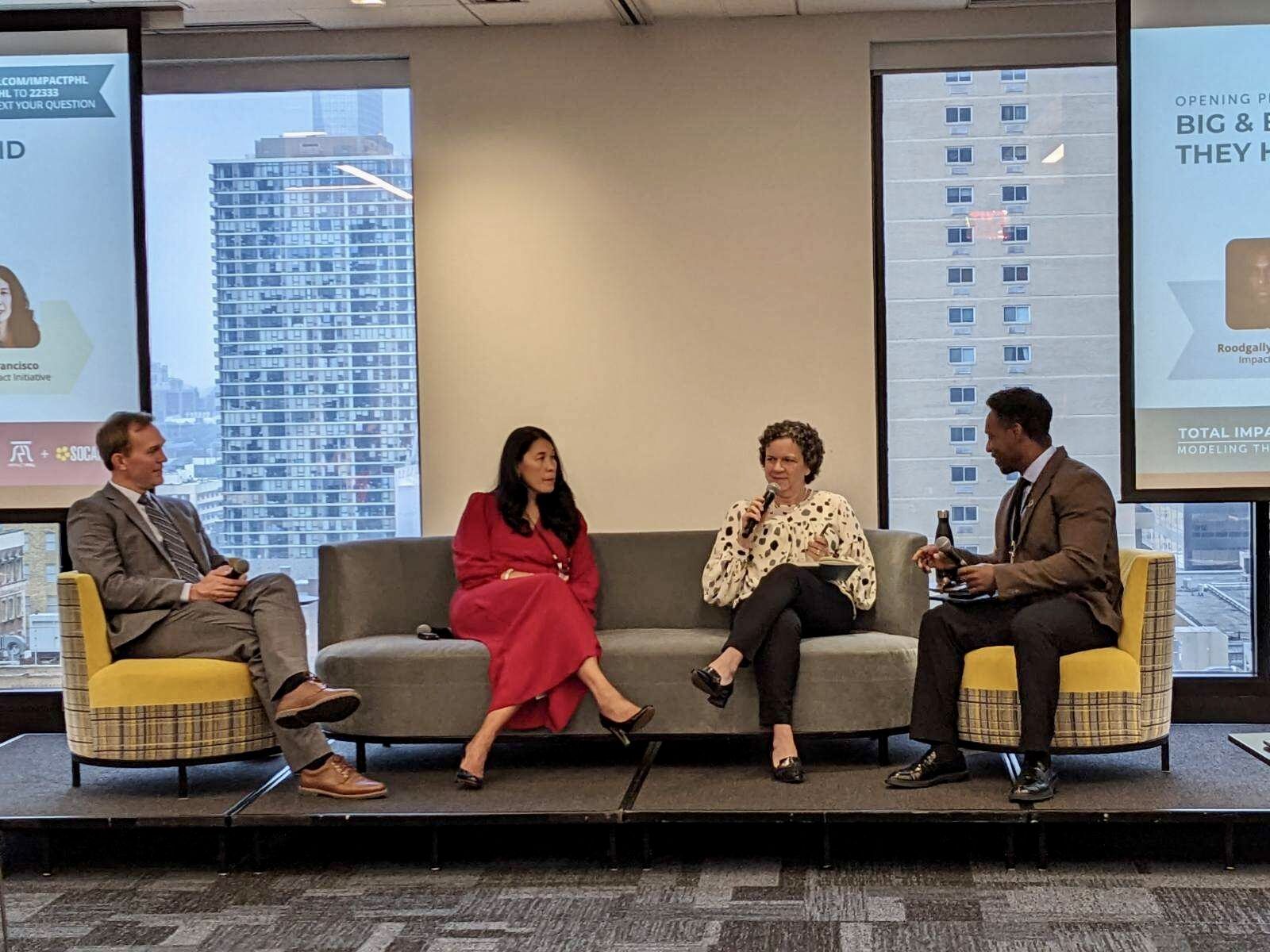Greetings, Agents of Impact!
Hop on today’s Agents of Impact Call No. 24. We’ll explore financing solutions for clean, affordable and reliable solar power for frontline public health clinics in Africa and South Asia. The World Bank’s Raihan Elahi, Sustainable Energy for All’s Jem Porcaro, UBS’s Phyllis Costanza and Liebreich Associates’ Michael Liebreich join We Care Solar’s Laura Stachel and ImpactAlpha‘s David Bank and special guests, today at 9am PT/ 12pm ET/ 7pm Kampala. Zoom right in
- Join the conversation before, during and after the call on our subscriber-only agents-of-impact Slack channel.
Have your say. Many thanks to all those who have answered our subscriber survey. Haven’t yet responded? Complete the short survey by Thursday, Oct. 15, to win one of five free tickets to this month’s SOCAP Virtual. Take the survey.
Signals: Ahead of the Curve
Bridging the credit gap for India’s impact enterprises. More than two million social enterprises and impact companies in India are delivering healthcare, expanding electricity beyond the grid and bringing tens of millions of unbanked adults into the financial system. Impact investors have invested billions of dollars in the form of equity. But debt capital has been in short supply. The lack of access to credit and working capital is slowing the expansion of products and services and leaving impact on the table. “Investment options are not as rich as they can be,” says Ramraj Pai of Impact Investors Council, host of this week’s India Impact Investing Week. “There is a very strong need and opportunity for foundations, for concessional capital, and for other sources of high-risk debt funding to support the build out of debt financing and impact.” The surprising finding in “Giving Credit Where Due,” a new report from the IIC and consulting firm Bridgespan, is that 60% of impact enterprises are, in fact, credit-worthy.
- Debt continuum. The report details barriers that enterprises face in accessing credit, including perceived risk, unproven business models and slim or no credit files. IIC and Bridgespan advocate customizable tools including collateral-based senior debt, unsecured junior debt, quasi-equity and grant-based finance. Credit guarantees can help startups advance into formal debt financing markets. Examples: Rabo Foundation and Caspian, for example, created a $2.5 million debt fund to help agtech innovators secure collateral-free working capital tied to cash flow. Eric Naranjo of USAID said a technical assistance grant and help with deal pipeline encouraged more agro-forestry lending by agriculture financier Samunnati.
- Credit gap. Investors have committed nearly $11 billion in impact capital in India in the past decade and $2.7 billion last year alone. More than 70% of those commitments have been in the form of equity. IIC and Bridgespan found a $216 million debt gap among the more than 400 startups they surveyed, with agriculture and healthcare ventures facing the greatest need. Of the debt-based impact investments in India, 90% went to enterprises focusing on financial inclusion and access (not including microfinance firms). Agriculture ventures claimed 5% of the pie.
- India’s impact investing week. Catch replays of “Prabhav 2020” and tune in to two more days of programming.
- Share this post.
Failure Files. When it comes to tackling complex social issues, failure is the norm. ImpactAlpha has teamed with India Development Review to amplify Failure Files, a series with Acumen Academy that tells the often-untold stories of social change leaders and entrepreneurs who have failed. In “To bribe or not to bribe?” Pakistani entrepreneur Ghazanfar Iqbal, co-founder of AutoSahulat, a platform for auto repairs, describes the sudden collapse of his startup for failing to bribe local officials. “The correct path—hard or not—takes you where you need to be,” Iqbal writes. “Perhaps I needed to be where I am.”
- Share your failure story. Here are the guidelines.
Partner Spotlight: SOCAP
Join SOCAP Virtual, Oct. 19 – 23. Participants at this year’s SOCAP won’t be roaming Fort Mason on San Francisco Bay. They will be laying the foundation for a new decade of impact investing and inclusive economic growth in dozens of virtual sessions focused on racial equity, climate action, future of work and other major issues. Register here and get a 20% discount.
Dealflow: Follow the Money
Generate Capital provides $600 million to Alturus for energy efficiency, generation and storage. Generate and Alturus both offer sustainable infrastructure-as-a-service, defraying upfront capital costs for clients (see, “Generate Capital raises $1 billion to scale sustainable infrastructure-as-a-service”). Generate builds, owns and operates green power, transportation, water and waste management facilities for clients such as schools and cities, while Alturus advises on, manages and structures financing for corporate energy systems, from heating and cooling to lighting. Generate will take an undisclosed minority stake in Boston-based Alturus and help provide up to $600 million in financing for energy efficiency, onsite generation and storage solution energy that the companies will own and operate. “Virtually every company in the Fortune 1000 has aging infrastructure challenges they are looking to solve,” Alturus’ Charles Esdaile told ImpactAlpha. More.
Concord’s creative economy fund targets underserved communities. Concord, a music and theatrical publishing and management firm, has created a $10 million initiative to support creative enterprises in underserved communities. Its first move: a partnership with Techstars Music, which Concord has supported since 2018. Concord committed $30,000 in seed investments for companies selected for Techstars’ 2021 music accelerator program, and up to $100,000 in their first outside rounds. Techstars Music has pledged that its cohorts will have at least 50% diverse CEOs and founders. Applications are open through Nov. 13. Share this.
Google selects 76 Black founders for Google for Startups awards. The $5 million Black Founders Fund was launched in June as part of the data giant’s $175 million initiative to promote economic opportunity for Black Americans (see, “Scaling the ‘capillary banking system’ to expand access to capital”). Each of the founders will receive cash awards of up to $100,000. The founders include Sonja Ebron of Courtroom5, which offers legal tools for people in court without a lawyer; Kenyon Hall of cleantech company SOIL; Kenya McKnight of the Black Women’s Wealth Alliance; and Dennis Cail of relationship-based lending app Zirtue. See the whole list.
TPG’s ESG-themed SPAC raises $350 million in a public offering. TPG formed the “blank check” special purpose acquisition company to make an acquisition based on environmental, social and governance, or ESG, factors. It said it will look for businesses already creating a positive impact, using ESG to outperform their peers, or where TPG can help accelerate ESG initiatives to improve outcomes. TPG Pace Beneficial Finance priced at $10 a share and may raise another $100 million when the acquisition closes.
Agents of Impact: Follow the Talent
Curtis Ravenel, formerly Bloomberg’s global head of sustainable business and finance, joins Context Labs as strategic advisor… Lynn Nicholson, ex- of Invest Europe, will head communications for the Global Steering Group for Impact Investing… MORTAR has openings in Cincinnati for a development and expansion manager and a program manager for entrepreneurship program alumni… TZP Group is hiring a senior associate of impact investing in New York… Cornell’s John Tobin and Suresh Sethi, Paulson Institute’s Li Zhu and The Nature Conservancy’s Andrew Deutz discuss “Financing Nature: Closing the Global Biodiversity Financing Gap,” Wednesday, Oct. 14… The Conduit London is hosting a virtual open house, Tuesday, Oct. 27.
Thank you for reading.
–Oct. 8, 2020











